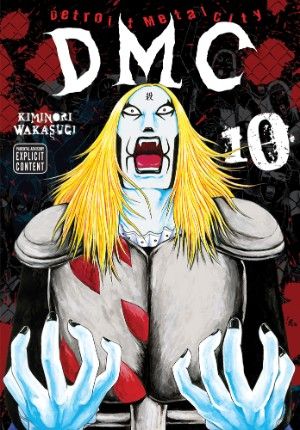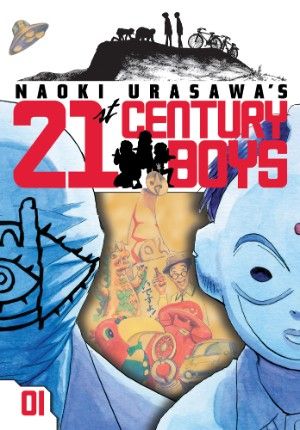This week, I thought I'd take the aural route and focus on series that have something to do with music and bands. Once again, there are many manga series in English that touch on this, everything from Beck: Mongolian Chop Squad to Sensual Phrase, Gravitation to Dragon Voice. There's so many that this will probably be a topic I revisit later, but I'll cover three of my favorites right now. And when I say favorites, I mean it. I love all three of these dearly, and at least two of them are essential reading. Happily, all the volumes of all three are still in print, so they should also be fairly easy to get.
Detroit Metal City - Kiminori Wakasugi (10 volumes)
Poor Souichi Negishi is a starry-eyed 20-year-old that moves from his parent's remote farm to Tokyo, hoping to make it big as a bubblegum pop star. He tries his best, taking his guitar and busking in parks and cafes, but Negishi is hilariously bad at pop music. What he isn't bad at is death metal, and he earns his living in the city by being frontman for underground metal band Detroit Metal City. To give you some idea, DMC has the costumes of Kiss and the lyrics and fans of Insane Clown Posse. Negishi hates this job, as the foul lyrics, loud disruptive music, and terrible message go against everything his pop music stand for. What's worse, he has an abusive manager that berates him constantly and rates his performances on how aroused she may or may not have been. But the magic of Detroit Metal City is that Negishi is a maniac, and any petty incident in his life is turned into a savage metal song where he acts out his vengeance, each a new hit loved by his adoring fans. Krauser, Negishi's frontman persona, isn't just an act. Negishi is Krauser. Along the way, DMC has metal match-offs with equally ridiculous and foul bands, public displays of vulgarity by both band members and fans alike, and many crises of conscience on Negishi's part. He often regrets his violent actions and terrible lyrics, and always wants to quit, but he just can't stop himself. As the series goes on, the band gains fame and fortune, and it's a lot of fun seeing how fame affects both Negishi and the fans. He tries everything he can to hide his identity (both ways, since the DMC fans beat him up when they see him after shows because he looks so out of place), but he often can't help donning the Krauser costume and doing something outrageous to people that offend him. Detroit Metal City is a comedy, and I've rarely laughed as hard as I do while reading it. The short, 10-page chapters are often one-shot stories, but each volume usually has an overarching plot of some kind. Wakasugi's art is cartoonish and somewhat amateur and flat, but it suits the series well. As a fair warning, the jokes are vulgar, juvenile, and lewd all the time (an ongoing throwaway joke is that the "real" Krauser can say f**k ten times in one second, for instance), and they also tend to repeat themselves throughout the ten volumes. It's definitely not for everybody, but those that enjoy this type of humor absolutely shouldn't miss it. It's short enough that it ends before the jokes wear themselves out completely, and the ending is one of the most triumphant concerts in comics. Also, this series has an excellent English adaptation, which is very important for something this outrageous.
Nana - Ai Yazawa (21+ volumes)
The story of two girls named Nana that move to Tokyo for different reasons, but wind up living together, is still one of the most bittersweet comic series I've ever read. Music is a huge part of it. The twentysomething titular Nanas meet on the train on the way to Tokyo, and again by coincidence when they wind up touring the same awesome apartment at the same time and decide to live together. Nana O is the musician, but Nana K is a total groupie who is the biggest fan of superstar Takumi, the frontman for the band Trapnest. Not only is Takumi a childhood friend of Nana O, Trapnest's guitarist is also an ex-boyfriend of Nana O who left her when he got signed as a professional musician. Nana O is currently doing well with her band, the Black Stones, whereas Nana K is merely trying to find an identity for herself. She has a terrible habit of completely falling for the first man that crosses her path, and while she tries to break it and be more independent, it catches up with her in a big way not very far into the series. If you couldn't already tell, Nana is a huge soap opera, as much about the relationships between the characters (mostly the members of the bands Trapnest and Black Stones) as it is about the careers of the two main bands. The whole thing is also told in the form of a flashback, where Nana O and the rest of the characters are older adults who are looking for any clues as to the whereabouts of Nana K. It's difficult to really talk about what makes this series great without spoiling anything, but the characters, relationships, and drama are all pitch-perfect and very realistic, in their overblown celebrity way. Ai Yazawa's art is also an absolute pleasure to look at. Her character designs and expressions are wonderful, her pseudo-photo backgrounds suit the urban setting quite well, her fashion design is top-notch, and she puts a lot of detail into every character in every panel. Unfortunately, she was struck by an unspecified, very serious illness in 2009, and has yet to return to work, so Nana is unfinished and leaves off on a terrible cliffhanger. But it's still absolutely worth reading. For more about what makes this series great, try The Nana Project.
20th Century Boys/21st Century Boys - Naoki Urasawa (24 volumes)
This one is only tangentially related, but it's about music as much as it is about anything else, and it's a really awesome series, so I'm going to slide it in as the third down here. It's named for a T-Rex song, and as it is a series largely focused on the dreams and aspirations of children, including being a rock star, it seems only appropriate to include it. It's hard to explain what 20th Century Boys is about, and even harder to say why it's amazing. It starts in the late 60s, with a group of grade school-aged friends who have a secret clubhouse and compile a plan for world domination that includes giant robots, germ warfare, aliens, and other far-fetched ideas that could only work in fiction. Flash-forward to the year 1999. A cult called "Friends" is gaining massive popularity, brainwashing seemingly everyone who comes in contact with its members. The leader of the 60s children, Kenji, works at his parent's store after failing to become the rock star he had always dreamed of. What's more, he's also taking care of his sister's daughter, who she left with him and ran off. Kenji and his friends begin to suspect that something about the Friends isn't on the level, and they begin investigating. Soon, terrible apocalyptic events begin to tear the major cities apart. Kenji realizes that it's exactly according to the plan that he and his friends wrote almost 30 years ago, and knowing what comes next, they try to stop it. After a valiant effort, Kenji is sacrificed on Bloody New Year's Eve, and is made into a terrorist and villain when the Friends regime steps in to "save" everybody on Earth from the acts of terrorism. Flash forward 15 or so years, and Kana, Kenji's baby niece, is now leading the underground resistance to the politically powerful Friends, along with what remains of Kenji's group of elementary school friends. Kana tries to stop the Friends, who gain more and more power over the people every day (down to a bizarre lifestyle restriction that all architecture and ways of life reflect the 60s in Tokyo), and meanwhile, the people themselves begin to wake up from the long nightmare as a mysterious song begins to be heard on pirated radio signals... one that's not very good, but is catchy and uplifting all the same. And that's the most sense I can make out of this series in a paragraph. The story constantly and masterfully switches between the present and the 60s to explain what's about to happen or to offer insight into the characters and situations. All the little details that would make a kid's life exciting are turned up to 11 and forced upon the citizens of Tokyo and Japan by the "Friend," the leader of the organization (who wears a mask bearing the "turn the page" logo of ubiquitous children's magazine Shounen Sunday). The identity and intentions of the Friend are a theme throughout, though the series rather hilariously dances around this issue for most of the run. Naoki Urasawa plots and draws a good story, and I do like his other series, but 20th Century Boys blows everything else out of the water. Less confusing than Monster, more interesting than Pluto, and several times more crazy than both while still being coherent, it's a very ambitious ride that's well worth taking. Music really does figure largely into the plot, as Kenji's taste in music in the 60s affects what the Friend does today, his failed career as a rock star contrasts with the dreams-made-real in the plot at large, and the music that keeps everyone going through the second half of the series becomes more and more important, until the whole thing ends with a massive rock concert for every citizen in Tokyo that may or may not save them from a killer biochemical agent released from UFOs. I read the volumes two months apart while they were released, and I suspect that may be for the best. There's a lot going on, and it's mysteriously easy to keep track of, but I think it may be overwhelming when taken in large doses. The main series is 22 volumes, but 21st Century Boys is a 2-volume coda that takes place immediately after the events of volume 22. The 24th volume arrived in my mailbox today, and now's as good a time as any to start at the beginning.




